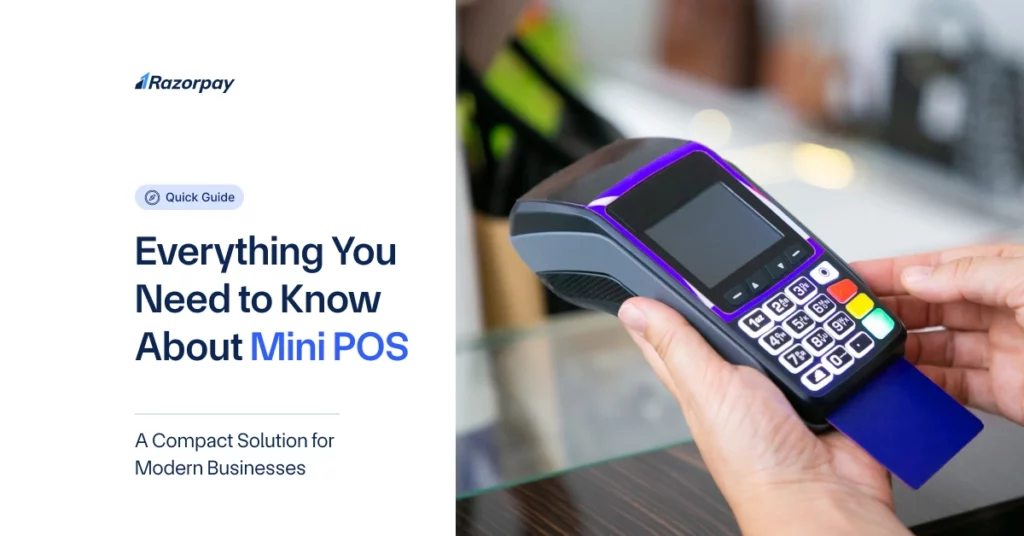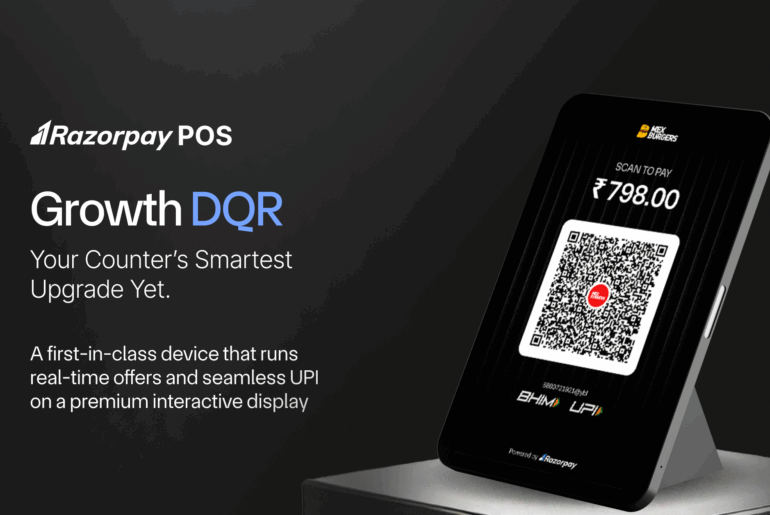In today’s fast-paced digital economy, businesses constantly seek ways to streamline their operations and enhance the customer experience. One such solution that has gained significant popularity is the mini POS system, a compact and portable device that enables merchants to accept digital payments seamlessly. This article covers mini POS machines, their benefits, and how they transform modern business transactions.
Table of Contents
What is a Mini POS system?
A mini POS terminal is a compact, lightweight, and mobile-friendly device that allows businesses to accept digital payments effortlessly. Unlike traditional POS systems, which are often bulky and stationary, a mini POS is designed for portability and ease of use. These devices can process payments through various methods, including debit/credit cards, UPI, mobile wallets, and even QR codes.
Mini POS systems are commonly used in a wide range of settings, such as:
- Food trucks and mobile vendors
- Small retail stores and boutiques
- Home-based businesses
- Delivery services and logistics companies
How Does a Mini POS Work?
Conducting a transaction using a mini pos machine is simple and efficient. Here’s a step-by-step breakdown:
- The merchant turns on the mini POS device.
- Customers select their preferred payment method (card, UPI, wallet, etc.).
- The device connects via Bluetooth, Wi-Fi, or SIM for transaction processing.
- Payment authentication is performed (via PIN, OTP, or biometric scan).
- The transaction is completed, and a receipt is generated (digital or printed).
It’s worth noting that the transaction process may slightly differ based on the payment method used. For example, card swipes require physical interaction with the device, while contactless NFC payments or QR code scans can be performed without direct contact.
Key Benefits of Using a Mini POS System
Mini POS systems offer several advantages that help businesses overcome common retail challenges:
- Affordability: Compared to traditional POS setups, mini pos terminals are cost-effective, making them accessible to small businesses on a budget.
- Convenience: The portable nature of mini pos devices makes them ideal for businesses that require mobility, such as street vendors or delivery services.
- Faster transactions: With a mini pos, customers can complete payments quickly, reducing waiting times and improving the overall checkout experience.
- Multiple payment options: Mini pos machines support various payment modes, including UPI, cards, and wallets, ensuring customers can pay using their preferred method.
- Enhanced security: Mini pos systems employ encrypted transactions and adhere to stringent security standards, protecting both businesses and customers from fraudulent activities.
Things to Consider Before Getting a Mini POS
Before investing in a mini POS system, here are some key factors to consider:
1. Features that fit your needs
Every business has unique requirements, and it’s crucial to choose a mini POS that aligns with those needs. Some essential features to look for include:
- Support for multiple payment methods
- Adequate battery backup for uninterrupted usage
- User-friendly interface for easy operation
2. Device compatibility
Some mini POS terminals require smartphones or tablets to function, while others can operate independently. Ensure your chosen device is compatible with your existing hardware and operating system (Android, iOS).
3. Internet connectivity
Stable internet connectivity is vital for smooth POS transactions. Consider the connectivity options available, such as Wi-Fi, SIM-based, or Bluetooth, and choose a device that suits your business environment. Poor connectivity can lead to transaction failures and negatively impact the customer experience.
Conclusion
Mini POS systems have emerged as a game-changer for small and mobile businesses, offering a compact and affordable solution for accepting digital payments. By carefully evaluating your business needs and selecting the right mini POS device, you can streamline your payment processes, enhance customer satisfaction, and stay ahead in the rapidly evolving digital payment landscape.
Related Read: What Is a Smart Terminal?
Frequently Asked Questions (FAQs)
1. How is a Mini POS different from a traditional POS machine?
A mini POS is smaller, more portable, and often more affordable than traditional POS machines. It is designed for businesses that require mobility and flexibility in accepting payments.
2. Who should use a Mini POS system?
Mini pos systems are ideal for small businesses, mobile vendors, delivery services, and any business that needs to accept payments on the go.
3. What payment methods does a Mini POS support?
A mini pos typically supports various payment methods, including debit/credit cards, UPI, mobile wallets, and QR code-based payments.
4. Is a Mini POS system secure for transactions?
Yes, mini pos terminals employ advanced security measures such as data encryption and comply with industry standards to ensure secure transactions.
5. Can I accept international payments using a Mini POS?
The ability to accept international payments depends on the specific mini pos device and the payment service provider.
—check with your provider for details.
6. How much does a Mini POS system cost?
The cost of a mini POS system varies depending on the features, brand, and service provider. However, they are generally more affordable than traditional POS setups, with some providers offering pay-as-you-go pricing models.
7. Does a Mini POS require the internet to function?
Most mini POS devices require an internet connection to process transactions. This can be through Wi-Fi, mobile data (SIM-based), or Bluetooth connectivity.
8. What are the POS Machine Charges for Mini POS transactions?
POS Machine Charges for mini POS transactions can vary depending on the service provider and the type of transaction. Always check fees and pricing before choosing a system.


